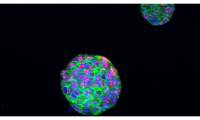-
ASTRUM-004 Featured on the Cover of Cancer Cell
- Source: drugdu
- 132
- February 22, 2024
-
Spit Test Detects Breast Cancer in Five Seconds
- Source: drugdu
- 103
- February 21, 2024
-
Daiichi Sankyo and AstraZeneca’s lung cancer antibody set for FDA review
- Source: drugdu
- 134
- February 21, 2024
-
Astellas’s CAR Tech Deals Speed Up Its Pursuit of In Vivo Cancer Cell Therapies
- Source: drugdu
- 127
- February 20, 2024
-
Dragonfly and Gilead enter partnership for cancer therapy
- Source: drugdu
- 169
- February 19, 2024
-
QBiotics wins FDA orphan status for rainforest-derived cancer drug
- Source: drugdu
- 108
- February 19, 2024
-
New Stool Test for Detecting Colorectal Cancer Could Reduce Unnecessary Colonoscopies
- Source: https://www.labmedica.com/molecular-diagnostics/articles/294800242/new-stool-test-for-detecting-colorectal-cancer-could-reduce-unnecessary-colonoscopies.html
- 184
- February 15, 2024
-
Innovate UK grants funds for breast cancer therapy project
- Source: https://www.pharmaceutical-technology.com/news/innovate-uk-funds-breast-cancer/?cf-view
- 103
- February 14, 2024
-
Cancer treatment could identify patients most likely to respond to cancer drugs
- Source: https://actionkidneycancer.org/cancer-treatment-could-identify-patients-most-likely-to-respond-to-cancer-drugs/
- 93
- February 13, 2024
-
Blood biomarkers in TGF-β pathway identify hidden liver cancer risk
- Source: https://www.news-medical.net/news/20240209/Blood-biomarkers-in-TGF-ceb2-pathway-identify-hidden-liver-cancer-risk.aspx
- 160
- February 12, 2024
your submission has already been received.
OK
Subscribe
Please enter a valid Email address!
Submit
The most relevant industry news & insight will be sent to you every two weeks.













